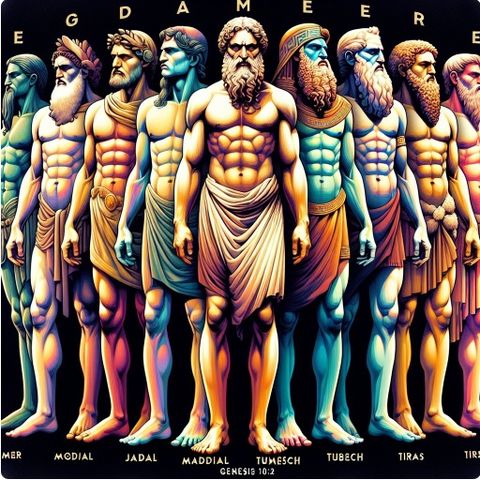Japheth's Sons

Scarica e ascolta ovunque
Scarica i tuoi episodi preferiti e goditi l'ascolto, ovunque tu sia! Iscriviti o accedi ora per ascoltare offline.
Japheth's Sons
Questa è una trascrizione generata automaticamente. Si prega di notare che non è garantita la completa accuratezza.
Descrizione
Now it is time for our verse break down: Genesis 10:2 The sons of Japheth; Gomer, and Magog, and Madai, and Javan, and Tubal, and Meshech, and Tiras. The first...
mostra di piùGenesis 10:2
The sons of Japheth; Gomer, and Magog, and Madai, and Javan, and Tubal, and Meshech, and Tiras.
The first section in chapter 10's "table of nations" follows the sons of Japheth.
Japheth's descendants mostly settled to the north of where the nation of Israel would eventually reside.
While the Old Testament prophets sometimes mentioned them, they will not feature greatly in biblical events.
Thus, less is said of Japheth's successors.
They were not cursed, in the way that Canaan was (Genesis 9:25).
Nor were they especially blessed, in the way Shem's descendants led to Abraham and the eventual Messiah, Jesus Christ (Genesis 9:26).
However, the names of Japheth's seven sons can be correlated with the names and peoples of specific geographic regions in the ancient world, some of whom would intersect with the people of Israel from time to time.
Some of these names would be associated with city-states mentioned later in Scripture, such as Magog (Ezekiel 38:2), Tarshish (Genesis 10:4; Psalm 72:10; Ezekiel 38:13) and Kittim (Genesis 10:4; Numbers 24:24; Daniel 11:30).
Genesis 10:3
And the sons of Gomer; Ashkenaz, and Riphath, and Togarmah.
Rather than a deep line of fathers and sons, this passage shows a broad spread of brothers and cousins.
The previous verse listed Japheth's seven sons.
This verse lists three sons of Japheth's son, Gomer.
The descendants of these three sons became three tribes who settled to the north of the Promised Land.
These people appear to be the Cimmerians, also known as the Scythians.
Genesis 10:4
And the sons of Javan; Elishah, and Tarshish, Kittim, and Dodanim.
Accordingly, this passage explains the origins of the nations of the ancient world.
The previous verse listed the sons of Japheth's son Gomer.
This verse lists the sons of Japheth's son Javan.
These four sons are apparently connected to the peoples who would later become the Greeks.
Though Israel would not have many dealings in the Old Testament with the northern peoples who came from Japheth, these names and people do seem to be included in Bible prophecies.
Some of these can be found in Ezekiel chapters 27 and 37—39.
Culturally, the Greeks would become profoundly influential and would even conquer the territories of Israel under Alexander the Great.
Genesis 10:5
By these were the isles of the Gentiles divided in their lands; every one after his tongue, after their families, in their nations.
This text is broad, showing the various tribes which came from the major descendants of Noah.
The previous verses named the sons and grandsons of Japheth.
From Israel's perspective, the tribes and nations that formed from these men were located, for the most part, to the far north.
Most of these tribes would have little impact on Israel's history, until their descendants—the Greeks—conquered Israel's territory under Alexander the Great.
It's helpful to remember that this spreading out and having separate languages came after the events surrounding the tower of Babel in Genesis 11.
Until that time, all the people of the earth were concentrated in one region and spoke one language.
Informazioni
| Autore | Jerry M. Joyce |
| Organizzazione | Jerry Joyce |
| Sito | - |
| Tag |
Copyright 2024 - Spreaker Inc. an iHeartMedia Company
